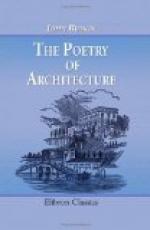187. Again, wherever the soil breaks out in simple blue country, whether in the river shore, or the broken roadside bank, or the plowed field, in nine cases out of ten it is excessively warm in its color, being either gravel or clay, the black vegetable soil never remaining free of vegetation. The warm tone of these beds of soil is an admirable relief to the blue of the distances, which we have taken as the distinctive feature of the country, tending to produce the perfect light without which no landscape can be complete. Therefore the red of the brick is prevented from glaring upon the eye, by its falling in with similar colors in the ground, and contrasting finely with the general tone of the distance. This is another instance of the material which nature most readily furnishes being the right one. In almost all blue country, we have only to turn out a few spadefuls of loose soil, and we come to the bed of clay, which is the best material for the building; whereas we should have to travel hundreds of miles, or to dig thousands of feet, to get the stone which nature does not want, and therefore has not given.
188. Another excellence in brick is its perfect air of English respectability. It is utterly impossible for an edifice altogether of brick to look affected or absurd: it may look rude, it may look vulgar, it may look disgusting, in a wrong place; but it cannot look foolish, for it is incapable of pretension. We may suppose its master a brute, or an ignoramus, but we can never suppose him a coxcomb: a bear he may be, a fop he cannot be; and, if we find him out of his place, we feel that it is owing to error, not to impudence; to self-ignorance, not to self-conceit; to the want, not the assumption of feeling. It is thus that brick is peculiarly English in its effect: for we are brutes in many things, and we are ignoramuses in many things, and we are destitute of feeling in many things, but we are not coxcombs. It is only by the utmost effort, that some of our most highly gifted junior gentlemen can attain such distinction of title; and even then the honor sits ill upon them: they are but awkward coxcombs. Affectation[37] never was, and never will be, a part of English character; we have too much national pride, too much consciousness of our own dignity and power, too much established self-satisfaction, to allow us to become ridiculous by imitative efforts; and, as it is only by endeavoring to appear what he is not, that a man ever can become so, properly speaking, our true-witted Continental neighbors, who shrink from John Bull as a brute, never laugh at him as a fool. “Il est bete, il n’est pas pourtant sot.”




